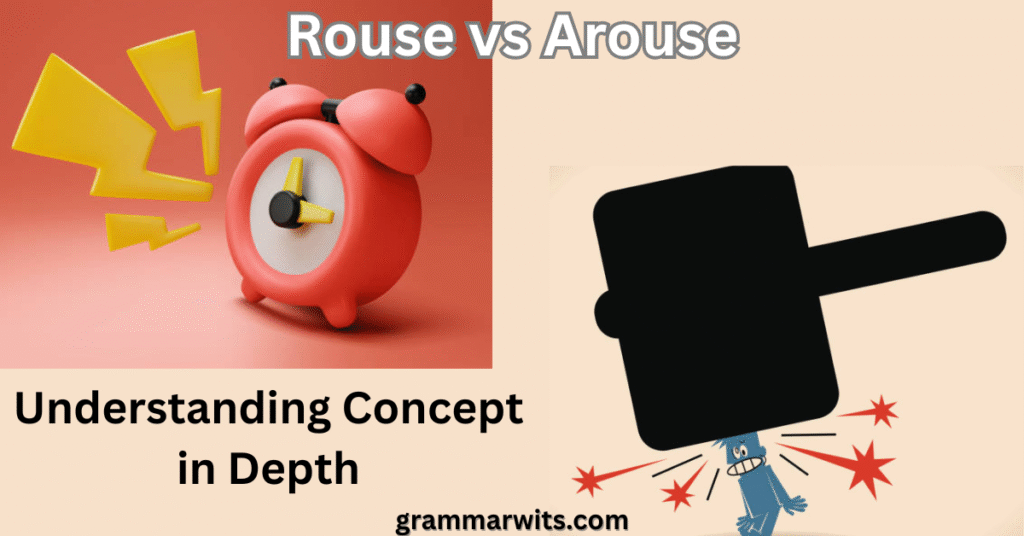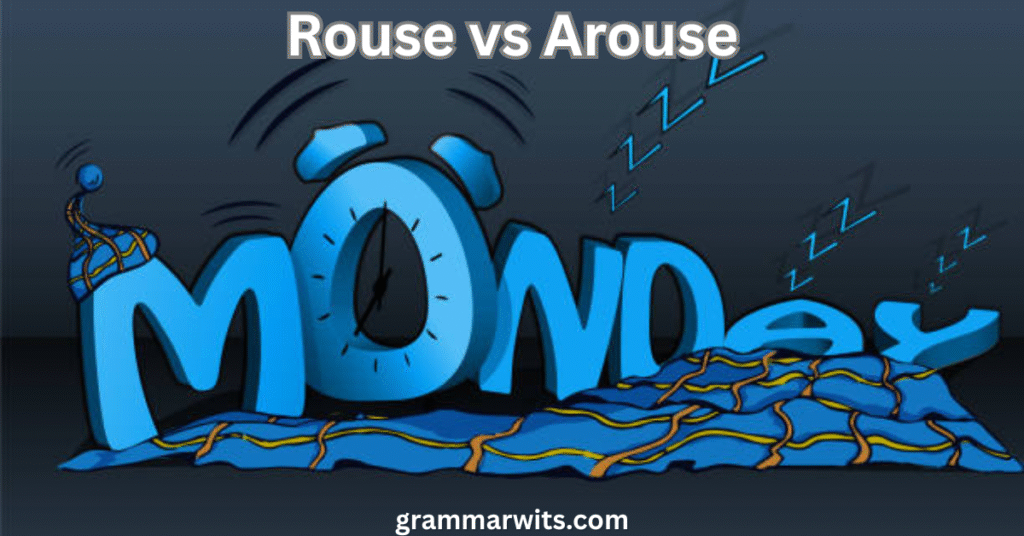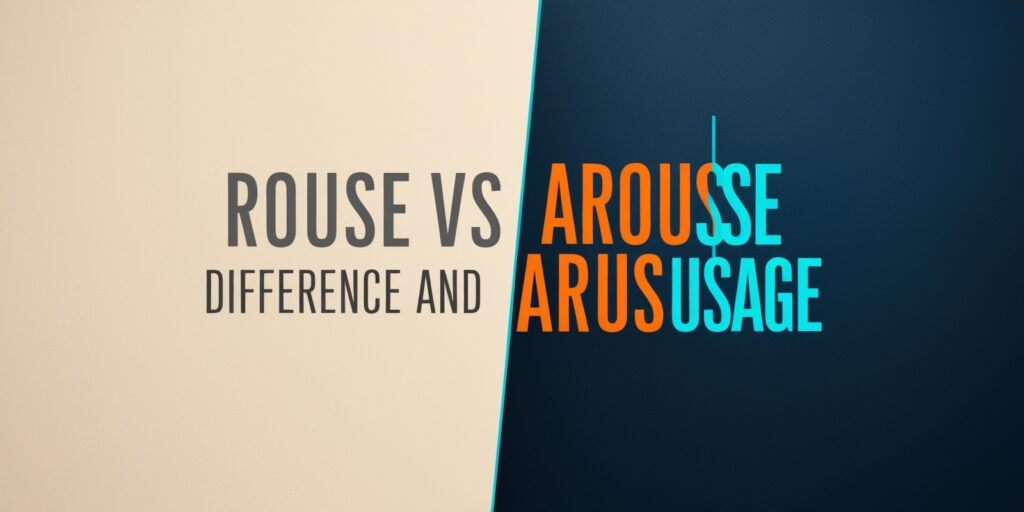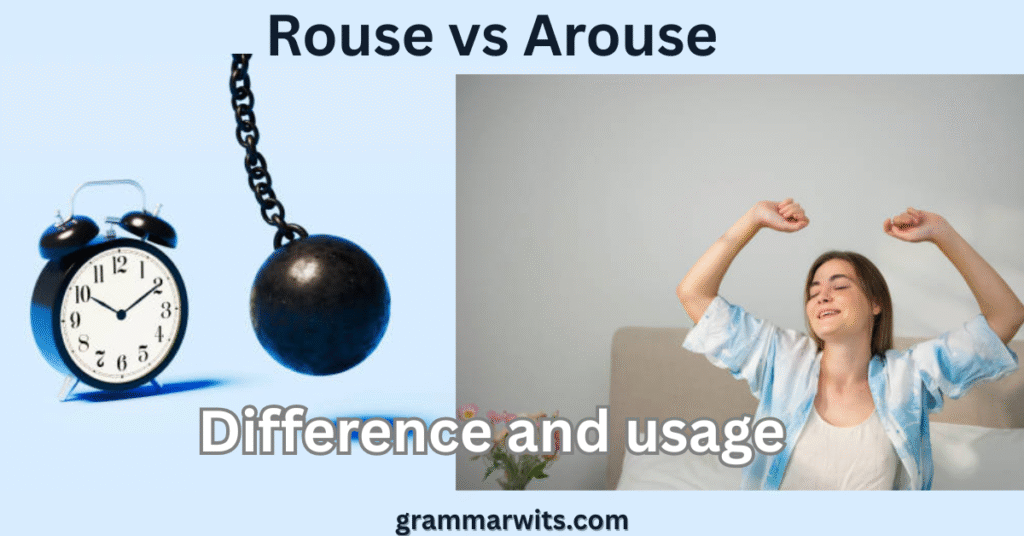“Rouse” and “arouse” are two English verbs that share similar sounds and roots but differ significantly in meaning and usage. “Rouse” typically refers to waking someone up or stirring them into physical activity, often used in literal contexts like waking from sleep or energizing a group. Understanding the “Rouse vs Arouse difference and usage” is essential for mastering precise English, as “rouse” typically refers to waking or stirring someone physically, while “arouse” is used to evoke emotions, feelings, or reactions.
Mastering subtle distinctions like these is what separates fluent speakers from beginners. Imagine writing or speaking with precision that not only avoids confusion but elevates your communication. When you understand the power of using “rouse” and “arouse” correctly, your language becomes sharper, more impactful, and much more engaging to your audience—whether you’re writing an essay, crafting a speech, or simply telling a story.
This guide explores the complete difference and correct usage of “rouse” vs “arouse” through definitions, examples, synonyms, and context-based comparisons. It’s more than a grammar lesson—it’s a language upgrade that enhances clarity and expression in your everyday communication.
The Root of Confusion
Why do so many writers struggle with the Rouse vs Arouse difference and usage? The confusion stems from several factors:
- Both words share similar pronunciation
- They have partially overlapping meanings
- Both relate to stimulation or awakening
- They derive from the same etymological roots
Let’s quickly compare their core meanings before diving deeper:
| Word | Primary Meaning | Secondary Meaning | Typical Objects | Connotation |
|---|---|---|---|---|
| Rouse | To awaken from sleep | To provoke to action | People, animals | Neutral |
| Arouse | To evoke emotion or feeling | To stimulate sexually | Feelings, desires | Often intimate |
As you can see from this table, while both words involve stimulation, they operate in different domains. The Rouse vs Arouse difference and usage becomes clearer when we examine their specific applications in various contexts.
Understanding “Rouse” in Depth

“Rouse” primarily means to wake someone from sleep or to stir someone to action. It often refers to a physical awakening or motivating someone to activity.
Primary Meanings of “Rouse”:
- To awaken someone from sleep or rest
- Example: The alarm clock roused him from a deep sleep.
- To stir up or provoke to action
- Example: The coach’s speech roused the team to play harder.
- To excite or stimulate to lively attention
- Example: The sudden noise roused his curiosity.
- To cause anger or excitement (often in the form “to rouse up”)
- Example: His comments roused the crowd to protest.
“Rouse” tends to be more direct and often involves physical movement or action. When considering the Rouse vs Arouse difference and usage, remember that “rouse” frequently involves external stimulation leading to physical responses.
“Nothing roused his fighting spirit like a challenge to his authority.” — Historical Biography of General Patton
Common Collocations with “Rouse”:
- Rouse from sleep/slumber
- Rouse someone’s anger
- Rouse to action
- Rouse suspicion
- Rouse oneself (reflexive usage)
Understanding “Arouse” in Depth
“Arouse” primarily means to evoke or awaken feelings, emotions, or desires. It often refers to internal states rather than physical awakening.
Primary Meanings of “Arouse”:
- To evoke or awaken an emotion or feeling
- Example: The documentary aroused sympathy for refugees.
- To stimulate sexually
- Example: The romantic setting aroused passionate feelings.
- To excite to action or to active pursuit of an objective
- Example: The scandal aroused public interest in government transparency.
- To stimulate or excite curiosity or interest
- Example: Her mysterious behavior aroused my suspicion.
When examining the Rouse vs Arouse difference and usage, note that “arouse” more frequently refers to emotional or mental stimulation, though it can sometimes refer to physical responses, particularly in sexual contexts.
“Great literature does not try to bewitch us, does not try to cajole us, but arouses in us a concealed emotion which is all the more powerful because it is concealed.” — Thornton Wilder
Common Collocations with “Arouse”:
- Arouse interest/curiosity
- Arouse suspicion
- Arouse sympathy/compassion
- Arouse desire
- Arouse concern
Side-by-Side Comparison: “Rouse” vs “Arouse”
Understanding the Rouse vs Arouse difference and usage requires looking at multiple dimensions of these words:
Semantic Differences
Rouse:
- More often refers to physical awakening
- Often involves a change from inactivity to activity
- Frequently applies to awakening from sleep
- Can refer to stirring up emotions, particularly strong ones like anger
Arouse:
- More often refers to emotional or psychological stimulation
- Typically involves evoking feelings or responses
- Rarely used for literal awakening from sleep
- Commonly used for curiosity, suspicion, or sexual desire
Connotation Differences
The Rouse vs Arouse difference and usage becomes particularly important when considering connotations:
Rouse:
- Generally neutral in connotation
- Can be used in formal, professional, or casual contexts
- Rarely carries sexual implications
Arouse:
- Often carries stronger emotional connotations
- In certain contexts, has sexual implications
- Requires more care in professional settings
Usage Frequency
In modern English:
- “Rouse” appears less frequently overall
- “Arouse” is more common, particularly in academic and literary contexts
- The reflexive “rouse oneself” remains fairly common in British English
Memory Trick
To remember the Rouse vs Arouse difference and usage, think:
- Rouse relates to Rising or Reacting physically
- Arouse relates to Affect or emotional Awakening
Historical Evolution and Etymology

Understanding the origins of these words helps clarify the Rouse vs Arouse difference and usage.
Origin of “Rouse”
The word “rouse” has been in the English language since the late 15th century. It derives from:
- Old French “ruser” (to drive back or detour)
- Originally a hunting term referring to driving game from cover
- By the 1580s, it gained the meaning “to wake from sleep”
Origin of “Arouse”
“Arouse” is a younger word, formed by adding the prefix “a-” (meaning “to” or “toward”) to “rouse”:
- First appeared in the mid-17th century
- Initially meant “to rouse up or raise”
- By the 18th century, it had developed its emotional and sexual connotations
Shakespeare used “rouse” frequently in his works, particularly in “Hamlet” with the famous drinking phrase “to rouse,” but “arouse” wasn’t available to him as it hadn’t yet entered the language.
Practical Usage Guide
Knowing when to use each term is essential for mastering the Rouse vs Arouse difference and usage:
When to Use “Rouse”
Choose “rouse” when referring to:
- Waking someone from sleep
- Stirring to physical action
- Mobilizing a group for a cause
- Moving from inactivity to activity
Appropriate contexts:
- Professional settings
- General descriptions of awakening
- Motivational contexts
- Descriptions of physical movement
When to Use “Arouse”
Choose “arouse” when referring to:
- Evoking emotions or feelings
- Stimulating interest or curiosity
- Causing concern or suspicion
- Descriptions of desire or attraction
Appropriate contexts:
- Discussions of emotional responses
- Academic analysis of motivations
- Literary descriptions of internal states
- Discussions of curiosity or suspicion
Regional Differences
American and British English show slight variations in the Rouse vs Arouse difference and usage:
- British English retains more historical uses of “rouse”
- American English more strictly separates the terms
- The reflexive “rouse oneself” remains more common in British usage
Mastering These Terms in Context

The best way to understand the Rouse vs Arouse difference and usage is through examples in context:
“Rouse” in Action
- “The loud thunder roused the baby from her nap.”
- “It was difficult to rouse myself for the early morning meeting.”
- “The politician’s speech roused the crowd to cheer enthusiastically.”
- “She tried to rouse her teammates’ fighting spirit before the championship game.”
- “The smell of coffee roused him from his sleepy state.”
- “The scandal roused public anger against the corporation.”
- “They needed to rouse support for the new initiative.”
- “The soldiers were roused from their bunks by the sound of the alarm.”
“Arouse” in Action
- “His strange behavior aroused my suspicion.”
- “The documentary aroused worldwide interest in environmental issues.”
- “Her questions aroused his curiosity about the abandoned house.”
- “The scandal aroused public concern about political corruption.”
- “The book aroused strong emotions in its readers.”
- “Her research aroused interest among the scientific community.”
- “The new evidence aroused doubt about the suspect’s guilt.”
- “Beautiful music often arouses powerful feelings of nostalgia.”
Case Study: News Headlines
Consider how these terms appear in actual headlines:
Correct usage:
- “Protest Marches Rouse Support for Climate Action”
- “New Discovery Arouses Scientific Interest in Mars”
Incorrect usage:
- ❌ “Alarm Clocks Arouse Students for Early Classes” (Should be “Rouse”)
- ❌ “Mystery Novel Rouses Curiosity About Author” (Should be “Arouses”)
The Rouse vs Arouse difference and usage matters particularly in headlines, where precision is essential.
Synonyms and Related Terms
Expanding your vocabulary with synonyms can help solidify your understanding of the Rouse vs Arouse difference and usage:
Synonyms for “Rouse”:
- Awaken
- Wake
- Stir
- Rally
- Activate
- Prompt
- Incite
- Motivate
- Energize
- Spur
Synonyms for “Arouse”:
- Evoke
- Stimulate
- Trigger
- Excite
- Provoke
- Kindle
- Inspire
- Ignite
- Elicit
- Spark
Choosing the right synonym can often help clarify whether you need “rouse” or “arouse” in a specific context.
Practical Applications

Understanding the Rouse vs Arouse difference and usage has practical applications in various writing contexts:
Creative Writing
- Use “rouse” for physical descriptions of waking or movement
- Use “arouse” for emotional reactions and internal states
- Be mindful of unintended sexual connotations with “arouse”
Professional Communication
- “Rouse” is generally safer in professional contexts
- Use “arouse interest” with caution in business settings
- Consider “generate interest” instead of “arouse interest” in formal documents
In Academic Writing
- “Arouse” is commonly used in psychological and sociological contexts
- “Rouse” appears more frequently in historical and political discussions
- Be consistent with your usage throughout a document
Common Questions Answered (FAQ)
Can “rouse” ever have sexual connotations?
While “rouse” is generally neutral, in certain contexts it can have sexual implications, though this is much less common than with “arouse.” The Rouse vs Arouse difference and usage is clearest in this area, with “arouse” being the term that most commonly carries sexual connotations.
Is “arouse” always inappropriate in formal writing?
No, “arouse” is perfectly acceptable in formal writing when used appropriately. Phrases like “arouse interest,” “arouse curiosity,” or “arouse concern” are common in academic and professional contexts. However, writers should be aware of potential connotations and consider alternatives when in doubt.
Which term is more commonly used in modern English?
“Arouse” appears more frequently in contemporary writing, particularly in academic and journalistic contexts. “Rouse” remains common primarily in specific phrases like “rouse from sleep” or “rouse to action.”
Are there cases where these words are truly interchangeable?
Yes, in some contexts involving stimulating emotions or reactions, the Rouse vs Arouse difference and usage becomes blurred. For example, either “The speech roused anger” or “The speech aroused anger” would be correct, though they carry slightly different emphases.
How do these terms translate into other languages?
Many languages distinguish between physical awakening and emotional stimulation with different verbs, similar to the Rouse vs Arouse difference and usage in English. However, the sexual connotations of “arouse” may not carry over directly in translations.
Conclusion
Mastering the Rouse vs Arouse difference and usage enhances your precision as a writer and communicator. While these words share etymological roots and can sometimes overlap in meaning, they generally operate in different domains:
- Rouse primarily refers to physical awakening or stirring to action
- Arouse primarily refers to evoking emotions, feelings, or desires
Remember that context matters enormously when choosing between these terms. Consider not just the literal meaning but also the connotations and the setting in which you’re communicating.
The next time you hesitate between these similar-sounding verbs, recall this guide to the Rouse vs Arouse difference and usage. With practice, you’ll confidently select the perfect word to convey your exact meaning—whether you’re waking someone from sleep or stirring their emotions.
Additional Resources
For further exploration of the Rouse vs Arouse difference and usage, consider these resources:
- Merriam-Webster Dictionary
- Oxford English Dictionary
- Garner’s Modern English Usage by Bryan Garner
- The Elements of Style by Strunk and White
- Practical English Usage by Michael Swan
These references provide additional insights into subtle word distinctions and will help you continue building your vocabulary precision.
Author’s Note: Understanding subtle word distinctions like the Rouse vs Arouse difference and usage is key to mastering the English language. If you found this guide helpful, please share it with fellow writers and language enthusiasts!

Alizy Smith is a passionate language enthusiast and the admin of Grammar Wits. With a love for wordplay, grammar quirks, and witty expressions, she’s dedicated to making language learning fun and accessible. From grammar tips to pun-filled laughs, Alizy ensures every piece of content entertains while educating — turning tricky rules into easy, enjoyable reads.
